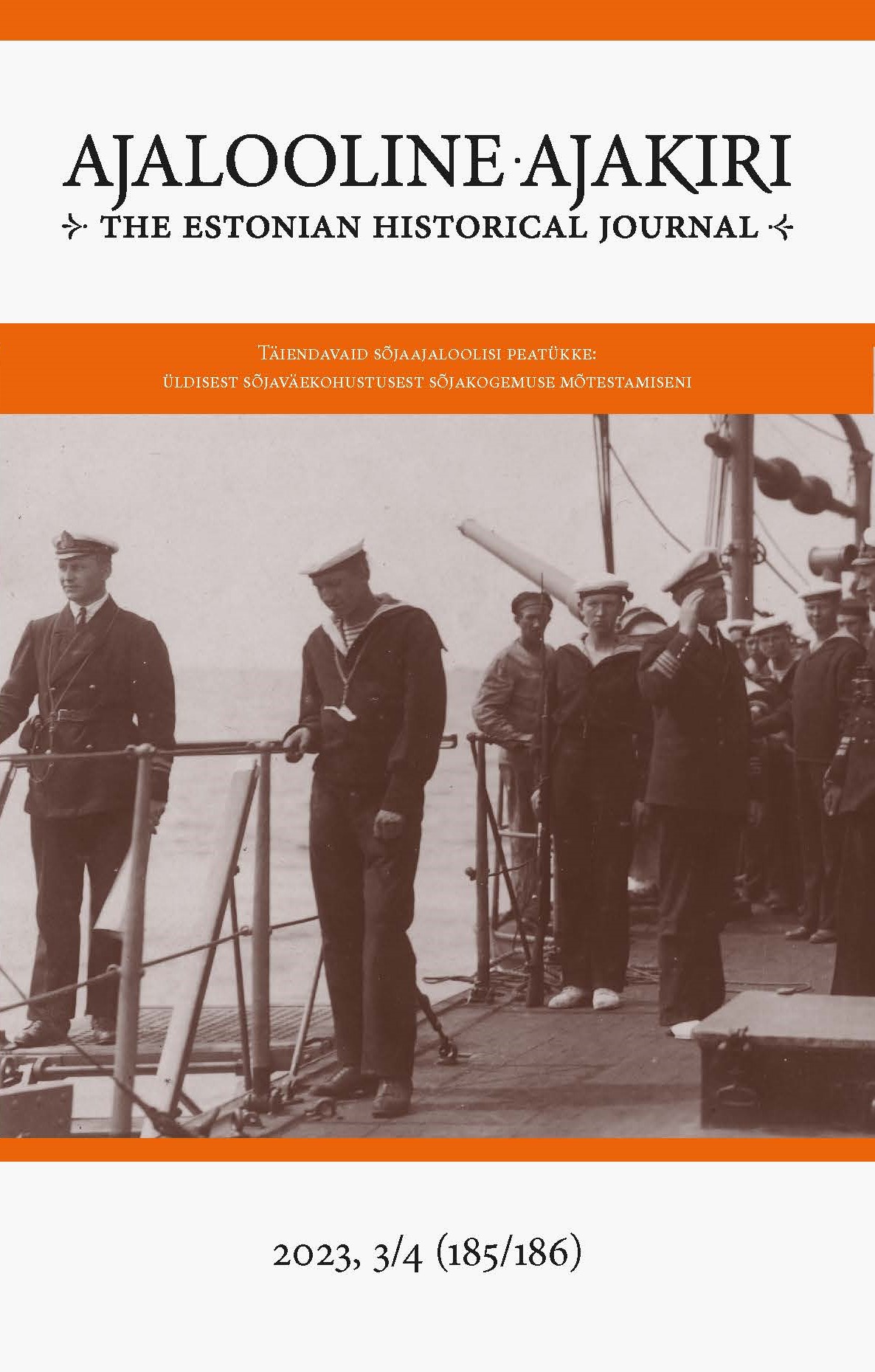Mälestuste jõud on sündmuste korduvuses. Sõjakogemuse mõtestamine Oskar Nõmmela ja Gustav Vilbaste kirjavahetuse näitel
DOI:
https://doi.org/10.12697/AA.2023.3-4.07Keywords:
war experience, constraint, fighting capacity, everyday relationships, timeline, correspondence, memoirs, sõjakogemus, sundsituatsioonid, võitlusvõime, igapäevased inimsuhted, aegrida, kirjavahetus, mälestusedAbstract
The power of memoirs lies in the repetitiveness of events. Interpreting war experience as described in the correspondence between Oskar Nõmmela and Gustav Vilbaste
The 20th century has repeatedly shaped the war experiences of Estonia’s residents. Many were destined to partake in more than one war or situation that was forced upon them. This article analyses the war experience of men from the generation of the 1890s based on the example of Oskar Nõmmela. Several wars affected the course of his life, as did situations forced upon him, starting from World War I and extending to his release from imprisonment in Soviet camps and his return to Estonia in the 1960s, including the years during which he lived in nursing homes.
That which is seen and experienced in the course of war events is not static. It changes over time. Its interpretation is framed by social-political context, collective memory, customs and norms, temporal distance, the specifics of the presentation of experience, and much more. War is experienced on three levels – events that have taken place in reality, assessments directly ascribed to that which has taken place, and meanings ascribed in the course of later interpretation. The concept of war experience has also been expanded to other situations that are forced upon people (such as imprisonment, deportation). Comparison of experiences over a longer timeline helps to more clearly understand factors that accompanied changes and the meanings of those changes, which are both universal and individual. The resilience of individuals and society, and their fighting capacity as a whole, as a multilayered phenomenon of culture and politics of security, morally affect our actions or inactivity daily.
The article’s main source is the correspondence between Oskar Nõmmela and Gustav Vilbaste from 1957 to 1967. This is an extraordinary collection of letters in many respects. This correspondence between two people, as a lengthy communication process in the form of questions and answers presented to one another, allows us to analyse various topics. In this process, meanings were given to many situations that had been forced upon them in the past and the present, starting with the Revolution of 1905 and military service in World War I and extending to the men’s current period, including the years that followed Nõmmela’s imprisonment, during which he lived in homes for the disabled in Uhta (Komi ASSR) and Estonia SSR (1963–69). The men not only reflect on the past. They juxtapose that which has taken place with the situations of their present day, using past experiences to come to grips with their current problems (Soviet living conditions in the 1960s). The men’s surprisingly frank style of communication adds uniqueness. Although their letters were written with the knowledge that the authorities could read them, they express the wish to give a broader meaning to the experiences that they had gone through with an eye to the future. The message of the Nõmmela-Vilbaste correspondence is: whatever one’s experience may be, it is important to document and make sense of it. Only in that way will experience become something that subsequent generations can rely on – the power of memoirs lies in the repetitiveness of events.
Giving meaning to that which has been experienced in life is a continuous process. One’s experiences are reflected differently arising from many factors, such as social-political, cultural, and spiritual factors, those based on age, and others. Thanks to the viewpoint of a long timeline, comparison of Nõmmela’s texts (memoirs of World War I and the Estonian War of Independence written in 1937, his personal file drawn up by the Soviet security organs in 1940s, and correspondence from 1957 to 1967) allows us to evaluate phenomena of historical events and personal history, the meanings ascribed to them, and also the backgrounds of changes that had occurred in those meanings.
When recalling past situations years or decades later, circumstances that appear to have been more important (events, people, processes) stand out, are more vividly recalled, or for some reason have greater meaning – there are manyfold possibilities here. The most pervasive features of Nõmmela’s experience were everyday interpersonal relations with companions and with representatives of the regime, and finding a necessary social network. These were affected by relations between nationalities, the social background of individuals, cultural attitudes and values, and attitudes and values based on world views. While those attributes are noted in the memoirs he wrote in 1937, his later correspondence not only affirms the importance of those attributes but also adds real-life details and points to the importance of maintaining the will to fight in one’s everyday activities. And although Nõmmela realised how necessary it was to retain a fighting spirit, he as well was nevertheless unable to escape despair and difficulties in adapting to living conditions, which have always been characteristic of persons who have returned from war or imprisonment. The correspondence between Nõmmela and Vilbaste demonstrates how important supportive friendly relations are, as well as how intense an exchange of views can become with a person who has had to conceal his own self, thoughts, and will, and who has become alienated from home life because of having been away for a long time. Writing about one another’s experiences in correspondence helped Nõmmela to cope with trauma, mourning, and social isolation.
It is remarkable how various situations that had been forced upon the men – World Wars I and II, imprisonment, forced banishment, and hospitalisation – started becoming intertwined with one another in retrospect, and how old strategies manifested themselves again in new, altered circumstances. It is also noteworthy how maintaining the will to struggle for survival was connected to the need for the sympathy of companions and for the steadfast affirmation of aims, values, and will – for oneself as well as others.
Downloads

